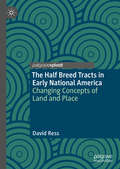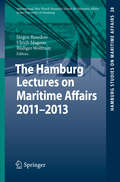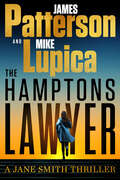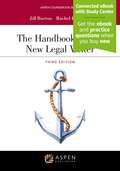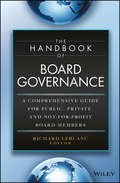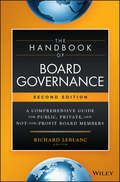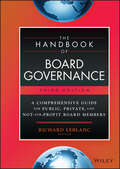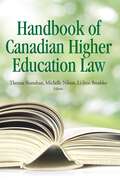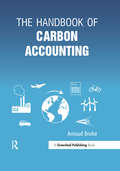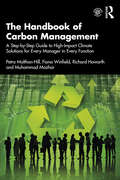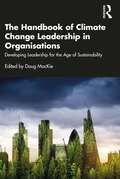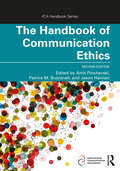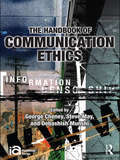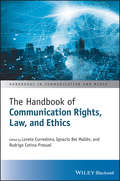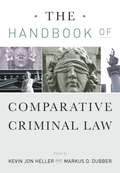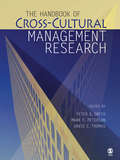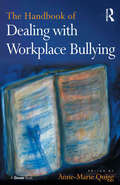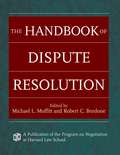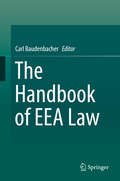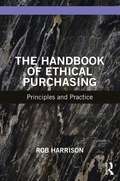- Table View
- List View
The Half Breed Tracts in Early National America: Changing Concepts of Land and Place
by David RessIn 1824 and 1830, over one hundred thousand acres across Iowa, Minnesota and Nebraska were set aside as a home for descendants of Native American women and white traders and trappers. The treaties that established these so-called Half Breed Tracts left undefined exactly who held claim to the land, and by the end of the 1850s, settlers and speculators had appropriated virtually every acre for themselves. But in an era of ravenous westward expansion, why did the process of dispossession require three decades of debate and legal maneuvering? As David Ress argues, the fate of the Half Breed Tracts complicates longstanding ideas about land tenure and community in early national America.
The Hamburg Lectures on Maritime Affairs 2011-2013
by Jürgen Basedow Ulrich Magnus Rüdiger WolfrumIn 2007, the International Max Planck Research School for Maritime Affairs together with the International Tribunal for the Law of the Sea (ITLOS), both based in Hamburg, decided to establish an annual lecture series, the "Hamburg Lectures on Maritime Affairs" - giving distinguished scholars and practitioners the opportunity to present and discuss recent developments in this field. The present volume - the third in the series - collects the lectures held between 2011 and 2013 inter alia by Andrew Dickinson, Yvonne Marie Dutton, Bevan Marten, Andreas Maurer, Irini Papanicolopulu, aslav Pejovic, Juan L. Pulido, Andrés Recalde Castells, Thomas J. Schoenbaum and Rüdiger Wolfrum.
The Hammer of Witches: A Complete Translation of the Malleus Maleficarum
by Christopher S. MackayThe Malleus Maleficarum, first published in 1486–7, is the standard medieval text on witchcraft and it remained in print throughout the early modern period. Its descriptions of the evil acts of witches and the ways to exterminate them continue to contribute to our knowledge of early modern law, religion and society. Mackay's highly acclaimed translation, based on his extensive research and detailed analysis of the Latin text, is the only complete English version available, and the most reliable. Now available in a single volume, this key text is at last accessible to students and scholars of medieval history and literature. With detailed explanatory notes and a guide to further reading, this volume offers a unique insight into the fifteenth-century mind and its sense of sin, punishment and retribution.
The Hamptons Lawyer: A Jane Smith Thriller (A Jane Smith Thriller #3)
by James Patterson Mike LupicaUndefeated criminal defense attorney Jane Smith—known as the Hamptons Lawyer—never fails to make her case. The Hamptons on Long Island is known for its beautiful beaches, its luxury lifestyle—and its exclusive legal advice. When Jane Smith takes on a famous celebrity client, she&’s armed and ready: with brilliant arguments, hard evidence—and two Glocks. Yet she&’s chased down, shot at, and risks contempt of court. That&’s when mounting a legal defense turns into self-defense. Knowing every day in court could be her last, she&’s a survivor. For now.
The Hand and the Paw (Four Tails in Revolt)
by Marco Milani Louise LoehndorffAt the foot of the village of Colicchio there is a mysterious laboratory carrying out secret experiments. No one knows what is really going on until an extraordinary fact is revealed that will change reality and reverse the roles of humans and animals. A cat, a monkey, a dog and a mouse lead the revolt. A story that knows how to touch people and make them think. An intense and fast-paced book. A manifesto that is not only antivivisectionist but also antispeciesist, it presents us with a truth too often ignored: revenge is never the right path to take.
The Handbook Of International Loan Documentation
by Sue WrightThis new edition provides a highly practical and comprehensive resource for bankers and lawyers, at all levels of experience, involved in international lending. The author covers the terms of international loan documentation with comprehensive explanations of the purpose of the provisions, and of areas that may require negotiation.
The Handbook for the New Legal Writer (Aspen Coursebook)
by Jill Barton Rachel H. SmithBuy a new version of this textbook and receive access to the Connected eBook with Study Center on Casebook Connect, including lifetime access to the online ebook with highlight, annotation, and search capabilities. Access also includes practice questions, an outline tool, and other helpful resources. Connected eBooks provide what you need most to be successful in your law school classes.
The Handbook of Board Governance: A Comprehensive Guide for Public, Private, and Not-for-Profit Board Members
by John Fraser Richard LeblancBuild a more effective board with insight from the forefront of corporate governance The Handbook of Board Governance provides comprehensive, expert-led coverage of all aspects of corporate governance for public, nonprofit, and private boards. Written by collaboration among subject matter experts, this book combines academic rigor and practitioner experience to provide thorough guidance and deep insight. From diversity, effectiveness, and responsibilities, to compensation, succession planning, and financial literacy, the topics are at once broad-ranging and highly relevant to current and aspiring directors. The coverage applies to governance at public companies, private and small or medium companies, state-owned enterprises, family owned organizations, and more, to ensure complete and clear guidance on a diverse range of issues. An all-star contributor list including Ram Charan, Bob Monks, Nell Minow, and Mark Nadler, among others, gives you the insight of thought leaders in the areas relevant to your organization. A well-functioning board is essential to an organization's achievement. Whether the goal is furthering a mission or dominating a market, the board's composition, strategy, and practices are a determining factor in the organization's ultimate success. This guide provides the information essential to building a board that works. Delve into the board's strategic role in value creation Gain useful insight into compensation, risk, accountability, legal obligations Understand the many competencies required of an effective director Get up to speed on blind spots, trendspotting, and social media in the board room The board is responsible for a vast and varied collection of duties, but the singular mission is to push the organization forward. Poor organization, one-sided composition, inefficient practices, and ineffective oversight detract from that mission, but all can be avoided. The Handbook of Board Governance provides practical guidance and expert insight relevant to board members across the spectrum.
The Handbook of Board Governance: A Comprehensive Guide for Public, Private, and Not-for-Profit Board Members
by Richard LeblancThe revised new edition of the must-read guide for executives—provides comprehensive coverage of topics in corporate governance by leading subject-matter experts The Handbook of Board Governance is the marketing-leading text on public, nonprofit, and private board governance. Providing comprehensive, in-depth coverage, this unique text represents a collaboration of internationally-recognized academics and prominent organization directors, executives, managers, and advisors. Contributors include Ariel Fromer Babcock, Robert Eccles, Alice Korngold, Ellie Mulholland, Michael Useem, Elizabeth Valentine and John Zinkin. Practical, expert guidance enables readers to understand value creation and the strategic role of the board, risk governance and oversight, audit and compensation committee effectiveness, CEO succession planning, and other diverse board duties and responsibilities. Now in its second edition, the Handbook offers substantial updates and revisions reflecting contemporary trends, practices, and developments in board governance. New content includes discussions of pressing issues related to climate change, examination of information technology and cybersecurity challenges, and recent tax legislation that will impact executive compensation. Editor Dr. Richard Leblanc—an award-winning teacher, professor, lawyer, management consultant, and specialist on boards of directors—integrates practical experience and academic rigor to assist readers: Build and strengthen engaged and collaborative leadership in the boardroom Recognize the role and responsibilities of a well-functioning governing board Risk governance, assurance, and the duties of directors Keep pace with new trends in board governance and shareholder responsibility Measure performance and align performance measurement to executive pay Understand information technology governance, sustainability governance, and the different forms of governance Highly relevant to board and committee members regardless of sector or industry, The Handbook of Board Governance, 2nd Edition is an invaluable source of knowledge on all aspects of corporate and organization governance.
The Handbook of Board Governance: A Comprehensive Guide for Public, Private, and Not-for-Profit Board Members
by Richard LeblancExplore the practical realities of corporate governance in public, private, and not-for-profit environments In the newly revised third edition of The Handbook of Board Governance: A Comprehensive Guide for Public, Private and Not for Profit Board Members, award-winning professor and lawyer Dr. Richard Leblanc delivers a comprehensive overview of all relevant topics in corporate governance. Each chapter is written by a subject matter expert working in academia or industry and illuminates a different area of board governance: value creation and the strategic role of the Board, risk governance and oversight, board composition and diversity, the role of the board chair, blind spots and trendspotting in the boardroom, audit committee efficacy, and more. This latest edition contains updated coverage of a wide variety of key topics, including: Governing, auditing, and working from home, as well as conducting virtual and hybrid meetings New and necessary skillsets for directors, including contemporary environmental, social, and governance considerations for firms Diversity, equity, and inclusion issues impacting boards and firms, as well as the risks posed by corruption, organized crime, and cyber-crimeAn essential resource for board members and directors of organizations of all kinds, The Handbook of Board Governance is also an important source of information for managers and executives seeking greater understanding of the role of the board in the day-to-day and long-term management of a modern firm.
The Handbook of Canadian Higher Education
by Theresa Shanahan Li Jeen Broshko Michelle NilsonIn The Handbook of Canadian Higher Education Law, experts examine key legal issues in postsecondary education. Establishing the current governance arrangements for Canadian postsecondary education within a historical context, the editors provide a detailed look at the legislative framework of postsecondary education and the role of the federal and provincial governments in organizing, regulating, and funding these institutions. Individual chapters analyze and expound on legal issues associated with institutional governance and management, identifying laws that define the rights and freedoms of faculty and students, and the obligations of the institutions towards them. Contributors engage with a wide range of issues associated with community activities - such as research ventures, knowledge mobilization, commercial activities, partnerships with industry, and land development projects that are hosted by postsecondary institutions. Presenting a wide range of documentary analysis and study of case law, legislation, regulation, and policy, this essential contribution to public policy determines current and emerging legal issues facing the academy.
The Handbook of Canadian Higher Education Law
by Michelle Nilson Theresa Shanahan Li BroshkoA detailed look at of the laws that govern postsecondary education from inside and out.
The Handbook of Carbon Accounting
by Arnaud BrohéCarbon Accounting is a vital tool in enabling organisations to measure and report on their greenhouse gas emissions. As the need to respond to the causes and impacts of climate change becomes increasingly urgent, emissions calculations and inventories are a vital first step towards mastering climatic risk. The Handbook of Carbon Accounting offers an accessible and comprehensive presentation of the discipline. The book examines the different methods or instruments implemented by countries and companies – such as carbon taxation, carbon markets and voluntary offsetting – while revealing how these stem not simply from the aim of reducing emissions for the lowest cost, but more as a compromise between divergent interests and individual world views. It also explores the historical context of the emergence of carbon accounting, assessing its evolution since the Rio Conference in 1992 and the signing of the Kyoto Protocol in 1997, to the latest Conference of Parties in 2015 in Paris.The book concludes with a very practical guide to calculate, reduce, offset and disclose your carbon footprint.Like other management tools, carbon accounting may not be an exact science, but its contribution has never been more important. The Handbook of Carbon Accounting is a vital educational resource that will help readers – including those with no prior knowledge of the field – to understand carbon flows and stocks and to take action. It forms part of a movement that heralds the start of a new economic era in which the search for prosperity can live in harmony with the environment.
The Handbook of Carbon Management: A Step-by-Step Guide to High-Impact Climate Solutions for Every Manager in Every Function
by Petra Molthan-Hill Fiona Winfield Richard Howarth Muhammad MazharEvery manager and every employee in every function can embed climate solutions and reduce greenhouse gas emissions. This book, written by experts in the field of sustainability in business, shows you how. The climate crisis is one of the greatest challenges we face today, and it affects all aspects of business and society. Consequently, everyone needs to know the best high-impact climate solutions that can be embedded into their organisational area. In this book you will find ideas for your team, your department and your organisation to make this a reality. We provide you with implementation plans and inspiring case studies, with practical and helpful tools that will help you to scale up climate solutions effectively and efficiently. If you are an owner of a company or an executive in any organisation, you will benefit from this step-by-step guide on how to set up your own greenhouse gas management plan, how to set targets and how to reduce the greenhouse gas emissions of your whole organisation. We explain key terms such as Net Zero, Carbon Neutral, carbon emissions equivalents and the three scopes. In order to halve our emissions worldwide by 2030 to achieve Net Zero by 2050, individual actions on a large scale are required, but also systemic changes. We look at the bigger picture in this book and also how you could effect change. This is the first book to offer an easy-to-implement approach to decarbonise organisations and transform societies, and is appropriate for managers at any level. This book can also be used in business schools to inspire future managers and business leaders. Last, but not least, everyone can find ideas here that they can implement in their personal lives – let’s scale up together!
The Handbook of Climate Change Leadership in Organisations: Developing Leadership for the Age of Sustainability
by Doug MacKieClimate change is one of the most significant and challenging problems we face today, and many organisations have recognised their responsibility in reducing emissions and environmental degradation and regenerating biodiversity. However, conventional leadership has failed to respond adequately to the magnitude of the threat, and a profound change in corporate leadership is required to substantively cut emissions and change climate policy to minimise further destructive environmental impact. This book sets out the qualities and approaches needed by leaders to successfully develop and implement climate change mitigation and adaptation policies. Bringing together the foremost experts in climate change leadership from business, leadership, psychology and coaching backgrounds, this book addresses the failures of current leadership practice and proposes a variety of models of how climate change leadership capabilities can be effectively developed in organisations. It is structured around four concepts: foundations, which includes models of environmental, ecological and evolutionary leadership; transitions, which looks at transformational and ethical models that are being repurposed for the age of sustainability; progressions, which explores innovative models that are being developed for the current age including systems, adaptation and maturity-based models of leadership; and actions, which includes models of sustainable goal setting and climate leadership coaching and development. The book is written for corporate leaders, researchers and educators and will be an invaluable addition to the leadership curriculum and executive development programmes to help the next generation of leaders respond to global challenges.
The Handbook of Communication Ethics (ICA Handbook Series)
by Amit Pinchevski Patrice M. Buzzanell Jason HannanThe second edition of this handbook offers a thoroughly updated overview of the different approaches and perspectives in communication ethics today.Extending the path paved by its predecessor, this handbook includes new issues and concerns that have emerged in the interim—from environmentalism to artificial intelligence, from disability studies to fake news. It also features a new structure, comprised of three sections representing a wide array of communication ethics: traditions, contexts, and debates. Rather than focusing exclusively on a subset of ethics (such as interpersonal communication, rhetoric, or journalism, as do other handbooks of ethics in communication), this collection provides a valuable resource for those who seek a broader basis on which to study communication ethics.This handbook is a must-read for faculty, graduate students, and advanced undergraduate students in all areas of communication studies, as well as in neighboring disciplines such as rhetoric, media studies, sociology, political science, cultural studies, and science and technology studies.
The Handbook of Communication Ethics (ICA Handbook Series)
by George CheneyThe Handbook of Communication Ethics serves as a comprehensive guide to the study of communication and ethics. It brings together analyses and applications based on recognized ethical theories as well as those outside the traditional domain of ethics but which engage important questions of power, equality, and justice. The work herein encourages readers to make important connections between matters of social justice and ethical theory. This volume makes an unparalleled contribution to the literature of communication studies, through consolidating knowledge about the multiple relationships between communication and ethics; by systematically treating areas of application; and by introducing explicit and implicit examinations of communication ethics to one another. The Handbook takes an international approach, analyzing diverse cultural contexts and comparative assessments. The chapters in this volume cover a wide range of theoretical perspectives on communication and ethics, including feminist, postmodern and postcolonial; engage with communication contexts such as interpersonal and small group communication, journalism, new media, visual communication, public relations, and marketing; and explore contemporary issues such as democracy, religion, secularism, the environment, trade, law, and economics. The chapters also consider the dialectical tensions between theory and practice; academic and popular discourses; universalism and particularism; the global and the local; and rationality and emotion. An invaluable resource for scholars in communication and related disciplines, the Handbook also serves as a main point of reference in graduate and upper-division undergraduate courses in communication and ethics. It stands as an exceptionally comprehensive resource for the study of communication and ethics.
The Handbook of Communication Rights, Law, and Ethics (Handbooks in Communication and Media)
by Loreto Corredoira Rodrigo Cetina Presuel Ignacio Bel MallénDiscover how modern technological realities shape freedoms of expression and opinion with this comprehensive resource. The Handbook of Communication Rights, Law, and Ethics delivers an extensive review of the challenges facing modern communication rights. It offers readers an examination of the interplay between communication law and ethics and the role played by communication professionals in protecting individuals’ rights to communication. Distinguished authors Loreto Corredoira, Ignacio Bel Mallén and Rodrigo Cetina Presuel walk readers through the fundamental ideas and concepts that represent universal common ground regarding communication rights. They compare communication rights theories developed in Europe, the United States, Latin America, Australia, and East Asia to describe how communication-related freedoms and rights are formulated and applied around the world. Finally, the meaning of the phrases “freedom of expression” and “freedom of the press” are examined in the context of national constitutions and international human rights instruments.The Handbook of Communication Rights, Law, and Ethics provides readers with: A diverse, global perspective on how communication rights are protected and challenged around the world A universal vision of communication rights that encourages dialogue rather than confrontation A comparison of the American First Amendment of the Constitution with European communication rights theories and other legal traditions around the world An exploration of the frontiers of communication rights concepts, terminology, jurisdiction, and territoriality Perfect for professors, graduate students, doctoral students, and postdoctoral researchers studying communication rights and freedom of expression around the world, The Handbook of Communication Rights, Law, and Ethics also belongs on the bookshelves of researchers studying issues surrounding freedom of the press in North America, Europe, and Latin America.
The Handbook of Comparative Criminal Law
by Kevin Heller Markus DubberThis handbook explores criminal law systems from around the world, with the express aim of stimulating comparison and discussion. General principles of criminal liability receive prominent coverage in each essay--including discussions of rationales for punishment, the role and design of criminal codes, the general structure of criminal liability, accounts of mens rea, and the rights that criminal law is designed to protect--before the authors turn to more specific offenses like homicide, theft, sexual offenses, victimless crimes, and terrorism. This key reference covers all of the world's major legal systems--common, civil, Asian, and Islamic law traditions--with essays on sixteen countries on six different continents. The introduction places each country within traditional distinctions among legal systems and explores noteworthy similarities and differences among the countries covered, providing an ideal entry into the fascinating range of criminal law systems in use the world over.
The Handbook of Cross-Cultural Management Research
by David C. Thomas Mark F. Peterson Peter B SmithRenowned international experts Peter B. Smith, Mark F. Peterson, and David C. Thomas, editors of the The Handbook of Cross-Cultural Management, have drawn together scholars in the field of management from around the world to contribute vital information from their cross-national studies to this innovative, comprehensive tome. Chapters explore links between people and organizations, providing useful cultural perspectives on the most significant topics in the field of organizational behavior—such as motivation, human resource management, and leadership —and answering many of the field′s most controversial methodological questions. Key Features Presents innovative perspectives on the cultural context of organizations: In addition to straightforward coverage of structures and processes, this Handbook addresses locally distinctive, indigenous views of organizational processes from around the world and considers the interplay of climate and wealth when analyzing how organizations operate. Offers an integrated theoretical framework: At the start of each substantive section, the Editors provide context for the upcoming chapters by discussing how prevalent cultures in different parts of the world place emphasis on particular aspects of organizational processes and outcomes. Boasts a global group of contributing scholars: This Handbook features contributing authors from around the world who represent an outstanding mix of respected, long-standing scholars in cross-cultural management as well as newer names already impacting the literature. Provides an authoritative agenda for the future development of the field: All chapters conclude with a list of promising avenues for further research and a focus on issues that remain unresolved.Intended AudienceThis Handbook is an ideal resource for researchers, instructors, professionals, and graduate students in fields of business, management, and psychology.
The Handbook of Dealing with Workplace Bullying
by Anne-Marie QuiggThe topic of workplace bullying and abuse gained considerable public and media attention during 2013 when the scandal of events at the BBC was unveiled following an enquiry led by Dinah Rose QC. The Handbook of Dealing with Workplace Bullying, edited by Dr Anne-Marie Quigg, presents the collective wisdom and knowledge of a number of lawyers, management experts and academics from around the world. The key themes include understanding the law in each country represented and the responsibilities of individuals as well as management teams and governors in organizations. New case studies are supplied by people working with and within HR teams who have professional experience of dealing with the issue, as well as practical suggestions that are of use to managers, to people accused of bullying and also to people who find they are targets of bullying. Dr Quigg summarizes the range and scope of the contributions by the individual contributors, commenting on the research findings and professional experience that informs them. The book thus reflects the variety of options for dealing with bullying that are relevant in different parts of the world, and focuses on advice that is pertinent in real life, rather than presenting a collection of academic theories.
The Handbook of Dispute Resolution
by Michael L. Moffitt Robert C. BordoneThis volume is an essential, cutting-edge reference for all practitioners, students, and teachers in the field of dispute resolution. Each chapter was written specifically for this collection and has never before been published. The contributors--drawn from a wide range of academic disciplines--contains many of the most prominent names in dispute resolution today, including Frank E. A. Sander, Carrie Menkel-Meadow, Bruce Patton, Lawrence Susskind, Ethan Katsh, Deborah Kolb, and Max Bazerman. The Handbook of Dispute Resolution contains the most current thinking about dispute resolution. It synthesizes more than thirty years of research into cogent, practitioner-focused chapters that assume no previous background in the field. At the same time, the book offers path-breaking research and theory that will interest those who have been immersed in the study or practice of dispute resolution for years. The Handbook also offers insights on how to understand disputants. It explores how personality factors, emotions, concerns about identity, relationship dynamics, and perceptions contribute to the escalation of disputes. The volume also explains some of the lessons available from viewing disputes through the lens of gender and cultural differences.
The Handbook of Drone Photography: A Complete Guide to the New Art of Do-It-Yourself Aerial Photography
by Chase GuttmanDrones are the next frontier in photography. This cutting-edge technology, still unexplored by the masses, can bring visual artistry to new and exciting heights. The Handbook of Drone Photography will be the go-to manual for consumers wishing to harness the power of drones to capture stunning aerial photographs.This book covers everything one needs to choose the right drone, to get airborne, and to capture and share incredible content. With easy and straightforward instruction, the text will familiarize readers with their craft and its controls. Readers will master drones’ extraordinary image-capturing capabilities and review detailed photography tips that can bring their artistic vision to life. For the first time, aerial photography is open to everyone, and award-winning travel photographer Chase Guttman will guide readers’ drone ventures from beginning to end. The Handbook of Drone Photography can help anyone break into this thrilling, high-potential space and launch their own lofty explorations today.
The Handbook of EEA Law
by Carl BaudenbacherThis Handbook comprehensively addresses the breadth of law encompassed by the EEA Agreement, which extends the European Union's Single Market to three EFTA countries: Iceland, Liechtenstein and Norway. The Handbook is first and foremost intended for practitioners and legal scholars, but its approachable style makes it readily accessible for students. The Handbook provides the reader with a thorough grounding in the EEA Agreement, detailing how secondary EU law becomes applicable in the EFTA pillar, and the roles played by the EFTA Surveillance Authority and the EFTA Court. It considers the EEA Agreement from the respective perspectives of the national authorities, courts, and the legal professions of Iceland, Liechtenstein and Norway. The book meticulously examines substantive EEA law, beginning with the general principles and the four freedoms, through competition law and State aid to such aspects as the precautionary principle, tax law and mutual administrative and legal assistance. Emphasis is placed on jurisprudence and especially that of the EFTA Court. Each chapter has been written by a judge, noted practitioner or eminent academic in their respective fields and the book is divided into twelve parts: Part I History and main features of the EEA Agreement Part II Genesis of EEA Law Part III Institutions and Procedure Part IV National Authorities in the EFTA Pillar Part V National Courts in the EFTA Pillar Part VI The Practicing Bar in the EFTA Pillar Part VII General Principles and Prohibition Part VIII The Fundamental Freedoms Part IX Competition Law and Related Matters Part X Further Areas of Economic Law Part XI Law of Natural and Economic Resources Part XII Social Protection and Public Health
The Handbook of Ethical Purchasing: Principles and Practice
by Rob HarrisonFrom boycotts of plastics and palm oil by consumers, to the tracking of carbon footprints and modern slavery in their supply chains by businesses, buying ethically has now fully captured the public interest. The Handbook of Ethical Purchasing is designed to help both ordinary people and industry professionals to understand this new movement, its political background and, most importantly, how to become involved more effectively By looking in turn at sustainable supply chain management by companies, green public procurement by governments, and the ethical choices made by consumers, this book operates as a practical handbook for people across all industries and sectors to become involved in the important changes that need to be made. It provides the key principles, language, and techniques that companies, campaigners, certification schemes, and regulators are beginning to use to address the moral, practical, and political problems that commonly occur in this transition to more ethical economies. Written by a leading authority on ethical consumption, Rob Harrison, the book provides the reader with the tools to operate with confidence and effectiveness in an easy-to-access format. It also provides a useful structure to understand this new subject area for students of marketing, supply chain management, and business studies generally.
